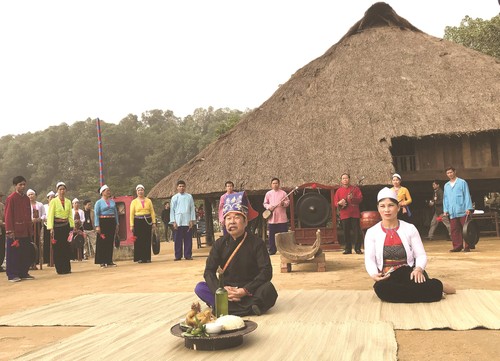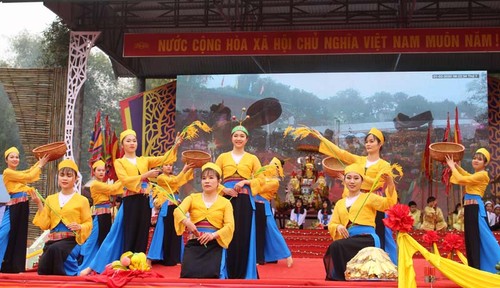 Shamans play important role in the Muong ceremonies. (photo: baodantoc.vn) Shamans play important role in the Muong ceremonies. (photo: baodantoc.vn) |
The rich culture of the Muong has spread from generation to generation mostly by word of mouth. Long ago, the Muong ancestors transcribed their spoken language using Chinese characters. Some of those ancient documents are still preserved in the Muong community.
In 1945 Vietnam adopted an official Vietnamese script. Muong people then began to transcribe their language into Vietnamese. A large number of poems and shaman’s prayers have been recorded and preserved by the Muong community.
Muong’s shamans are the guardians of Muong philosophy and education. In his life, a Muong person typically passes through 23 rituals conducted by shamans. The shaman prays for a newborn baby to eat heartily and grow up strong. When a child is ill, the shaman asks the Mother Goddesses to cure him. He conducts a ceremony to help adults chase away bad luck and evil spirits. Shamans are indispensable at weddings, housewarmings, and worshiping ceremonies. Shamans pray for old people to enjoy wisdom, good health, and longevity. When someone dies, the shaman acts as a guide to lead the deceased to the other world.
 A performance of Muong folk dance and songs at the Muong Bi Summer Festival 2020. (photo: baohoabinh.com.vn) A performance of Muong folk dance and songs at the Muong Bi Summer Festival 2020. (photo: baohoabinh.com.vn) |
Dinh Cong Tien, a Muong shaman in Tan Lac district, Hoa Binh province, says: “I learned to be a shaman when I was head of acooperative. I wrote down all the worship prayers I learned orally from old people. I listened to them, memorized them, and transcribed them. Worship prayers are a cultural treasure of the Muong.”
The Muong language and culture are being kept alive by Muong shamans. A Muong Culture Club was established in 2017 in Ngoi hamlet, Tan Lac district. A second Culture Club opened at Dinh hamlet, ManDuc township, in 2019. There people learn to play gongs, sing folksongs, dance, and make traditional costumes.
BuiThiMien, who teaches Muong folksongs at Dinh hamlet’s Culture Club, said the club attracts people of all ages. Old people join the club to recall their memories. All club members share their knowledge of Muong folk songs and ideas for preserving the Muong culture.
Member BuiVanYeu said“Muong folk songs are embedded in the minds of Muong people. They were created to commemorate important events. We sing them at weddings and funerals. I worry that one day modern culture will overwhelm our folk culture. I teach folksinging to anyone who wants to learn and preserve the Muong culture.”
The Muong account for 63% of the population of Hoa Binh province.